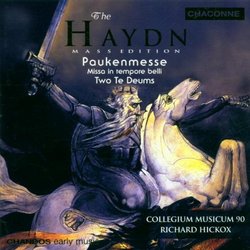| All Artists: Stephen Varcoe, Franz Joseph Haydn, Richard Hickox, Collegium Musicum 90, Catherine Denley, Nancy Argenta, Mark Padmore Title: Haydn: Paukenmesse, etc. Members Wishing: 0 Total Copies: 0 Label: Chandos Release Date: 1/19/1999 Genre: Classical Styles: Opera & Classical Vocal, Historical Periods, Classical (c.1770-1830), Sacred & Religious Number of Discs: 1 SwapaCD Credits: 1 UPC: 095115063323 |
Search - Stephen Varcoe, Franz Joseph Haydn, Richard Hickox :: Haydn: Paukenmesse, etc.
 | Stephen Varcoe, Franz Joseph Haydn, Richard Hickox Haydn: Paukenmesse, etc. Genre: Classical
|
Larger Image |
CD Details |
CD ReviewsBest of genre 03/07/1999 (5 out of 5 stars) "This is the fourth volume in the series of recordings of Haydn masses directed by Richard Hickox whose love and understanding of Haydn make him uniquely suited to this task. The series generated an enthusiastic critical response, particularly from Gramophone which said literally "we defy anyone not to enjoy these discs." As far as I know, Hickox set out to record six major masses which were written by Haydn towards the end of his life; as of today we have four volumes, so hopefully we should have two more some time soon. Each of these volumes constitutes a major musical event. In addition to this one, the volumes already issued are: Theresienmesse, Creation Mass, and Harmonienmesse. Hickox directs a sensitive and responsive period orchestra, well matched by the superb chorus and some of the best soloists on the English baroque scene. The result is some of the best Haydn on disc! NB: one of the "filler" pieces on this disc is Haydn's incidental music to Alfred, Konig der Angelsachen, sung by Argenta. There's a recording of Thomas Arne's Alfred which I would highly recommend if you can find it (try www.berkshirerecoutlet.com, if Amazon doesn't kill me for recommending another vendor), it was produced for BBC Music magazine a couple of years ago, with Padmore and Pierard as Alfred and his wife. That's the opera where "Rule, Britannia" comes from, it's excellent!" Must buy this wonderful version of haydn's best mass 07/25/1999 (5 out of 5 stars) "I have been lucky enough to perform this breath taking mass with an orchestra, and it is truly one of the finest works of choral music ever accomplished. If you like choral music, masses, or Haydn in general, then you will absolutely cherish this wonderful version of Haydn's Mass in the Time of War. Raw emotions flood these songs, and your heart will go out to 18th century Austrians when you hear Haydn's musical expression of Austria's suffering during the Napoleanic wars. Superb interpretation by Hickox." Exciting, Attention Getting 09/16/2000 (5 out of 5 stars) "This most exciting of masses is a jewel of choral music. Hickox and his Collegium create a cathedral of sound from Haydn's music. My enthusiasm continued all through the recording. Without Haydn, the wonderful melding of humor and seriousness, sacred and profane, would not be possible in the music of subsequent composers, and the last Haydn masses cannot be compared to anyone else's. And the "Paukenmesse," a favorite of many singers and listeners, reaches those heights that one would listen for in other great choral works, but is often missing."
|

 Track Listings (15) - Disc #1
Track Listings (15) - Disc #1